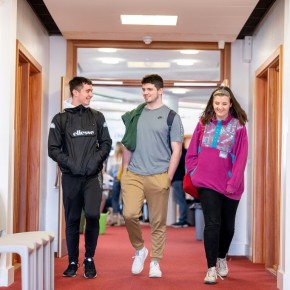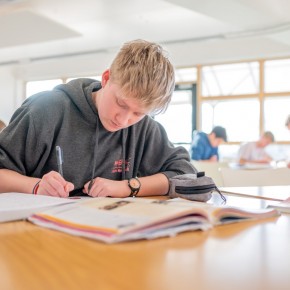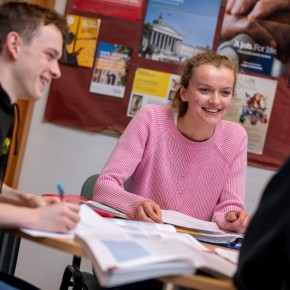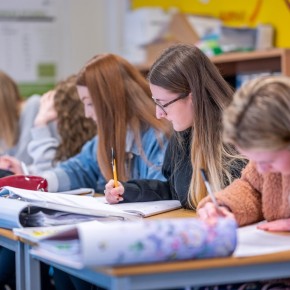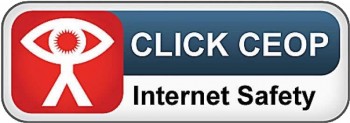Remote Learning Information
22.01.21_All Years_Guide To Remote Learning
09.12.20_All Years_Student Teams Guide 2020
REMOTE EDUCATION IN FULL LOCKDOWN: Information for Parents and Carers
This information is intended to provide clarity and transparency to pupils and parents or carers about what to expect from remote education where national or local restrictions require entire cohorts (or bubbles) to remain at home.
The remote curriculum: what is taught to pupils at home?
A pupil’s first day or two of being educated remotely might look different from our standard approach, while we take all necessary actions to prepare for a longer period of remote teaching.
What should my child expect from immediate remote education in the first day or two of pupils being sent home?
It is our intention that students in KS4 and KS5 – Years 10-13 – will usually be taught live online using the Teams app. This will happen at the same time as their timetabled lesson occurs when they are in school or college. Where possible KS3 pupils will also be given some kind of personal teaching experience – either a live lesson or a pre-recorded video from their teacher – at least once a week – often more. Obviously our ability to deliver live lessons does depend on staff who have their own children at home to care for being able to do that, but everyone will do their best. If staff are not able to provide a live lesson, the work will still be set on the Microsoft Teams app, and students should do that work within the usual timetabled slot.
Apart from finishing off tasks from lessons, no students in Years 7-11 will be set lengthy extra homework at this point. Online learning is extremely tiring and experience has taught us that this would cause unnecessary stress to students, who will cover plenty of work in their lesson time if they work hard.
We hope to have this system up and running right from the start of the Spring Term, but please bear with us if there are initial glitches, and contact us by email or a phone call to the school office if you have any questions.
All details of how this system will work and how to access Teams were sent to students and parents at the end of the Autumn Term, and are to be found with this document on the school website.
Following the first few days of remote education, will my child be taught broadly the same curriculum as they would if they were in school?
We intend to teach the same curriculum remotely as we do in school wherever possible and appropriate. However, we have needed to make a few adaptations in some subjects. For example, as well as practical tasks, PE lessons will have some modified content intended to build students’ knowledge of theory, as they may lack the facilities and equipment to follow their usual practical curriculum as they would in school.
Remote teaching and study time each day
How long can I expect work set by the school to take my child each day?
We expect that remote education (including remote teaching and independent work) will take pupils broadly the following number of hours each day:
|
Key Stage 3
|
Tasks will be set for each lesson throughout the usual timetabled 5 hour-long lesson day. Not every task will necessarily take an hour, but students should expect to work hard for at least three hours a day, and should try to attempt all tasks.
|
|
Key Stage 4
|
Students will have live lessons where possible and will be set work to do on Teams for their other lessons. This should all be done at the normal timetabled time if possible. They should expect to work for about 5 hours each day.
|
|
Key Stage 5
|
Students will have live lessons at their normal timetabled time wherever possible, and if not, will be set work to do during that lesson’s usual
timetable ‘slot’. They do not have classes every lesson, and will
therefore be set independent work to do in their study periods. They should expect to do a similar amount of work at home as they do when in College.
|
Accessing remote education
How will my child access any online remote education you are providing?
All work across the school and College will be set on the Microsoft Teams app and students should be able to use this as a gateway to any other software or resources that they might need. The details of the work each day will be posted on the Teams page for each class.
Details of how to access this were sent by email to all students and parents at the end of the Autumn Term and can also be found with this document on the website.
If my child does not have digital or online access at home, how will you support them to access remote education?
We recognise that some pupils may not have suitable online access at home. We take the following approaches to support those pupils to access remote education:
Parents have on several occasions been offered the chance to contact the school if they lack the necessary equipment for their child to access online learning. We have equipment that we are able to lend out and have done so in many cases.
- A number of students are entitled to support in school each day and access to equipment there. If any student cannot access online learning, please contact the school office; it is possible that they may be able to come into school to complete their lessons.
- On rare occasions, students may need to be provided with paper copies of the key work set. This is not a simple option and is challenging for both the student, who will inevitably miss out on parts of the rich curriculum we are attempting to offer, and the school, which will only have a skeleton staff at this time. However staff will always endeavour to ensure that all students can have key work available. Please understand that in these cases, work may not be set before lessons but in retrospect, and that it will need to be collected from the school at regular intervals, with completed work being returned for marking.
How will my child be taught remotely?
We use a combination of the following approaches to teach pupils remotely:
- live teaching (online lessons)
- live tutor group meetings for students to spend time with their tutor group and talk to their tutor
- recorded teaching (useful online video resources, video/audio recordings made by teachers )
- textbooks and reading books pupils have at home
Engagement and feedback
What are your expectations for my child’s engagement and the support that we as parents and carers should provide at home?
Our staff have worked incredibly hard over the last few months to train to deliver effective online teaching, and the school has invested heavily in equipment to help us do this, in an endeavour to provide the best curriculum possible during the closure.
We would therefore really hope that all students would engage with their education as fully as possible, taking part in as many live lessons as they can, completing the work set by teachers, and returning their work for marking and feedback. Just ‘being there’ is not really learning – as in class, students will learn best if they interact, asking and answering questions, working with their peers when asked to, handing in the work they are set, and noting the feedback given carefully and acting on it with thought and care.
We would be grateful if parents could offer their children support and encouragement at all times, ensuring that they are able to access the work and have an appropriate place in which to do it. Any support that you have time to give will always be helpful, but your most important role as parents is to keep us informed of any problems so that we can help as quickly as possible. It is also extremely helpful to have positive feedback – knowing what works well is incredibly useful!
We are completely aware that this is a very hard time for many families and would stress that the situations described above are what we aim for, and would like to happen in an ideal world. If your family are going through a difficult time we are there to support you and will not make unreasonable demands on your children or yourselves, but please do let us know about problems so we can help you get round them. Please also remember that teachers are also working from home, many of them with other family commitments and difficulties caused by Covid – we are all human, and there will be mistakes on both sides, but if we keep communicating with each other we can help support your children through this time with the best possible outcomes.
How will you check whether my child is engaging with their work and how will I be informed if there are concerns?
All staff will check attendance at lessons daily and completion of work very regularly.
Often first absences or work missing will just be dealt with by an email to the student. If there are continuing problems the subject teacher will contact you, either by phone or email.
If a student appears not to be engaging with very much work at all, pastoral staff will contact you to discuss any problems and help get things back on track.
How will you assess my child’s work and progress?
Feedback can take many forms and may not always mean extensive written comments for individual children. For example, whole-class feedback or quizzes marked automatically via digital platforms are also valid and effective methods, amongst many others. Our approach to feeding back on pupil work is as follows:
Staff will be monitoring your children’s work and will be contacting them if it is missing; if there continue to be problems, they will contact you by phone or email.
Assessment will take many forms – oral questioning in lessons, quizzes, essays to write, questions to answer, recordings to send etc. – just as in school, there are a wide variety of ways to assess understanding and learning, and making it varied helps your child to stay engaged.
Not all work will be marked in detail – some may just be checked quickly to ensure it has been completed. All students should however get regular feedback from their teachers. A rough guide of what to expect would be some form of personal feedback for KS5 and KS4 students once a fortnight, whereas KS3 students may receive personal feedback for at least one piece of substantial work in three. Again, this cannot be a rigid rule – teachers will try to ensure that students know how they are doing and how to improve, and feel valued and noticed, but if you feel that your child has not had feedback recently, or needs personal input, please contact the teacher – all students have different needs, and teachers are on a steep learning curve themselves!
Additional support for pupils with particular needs
How will you work with me to help my child who needs additional support from adults at home to access remote education?
We recognise that some pupils, for example some pupils with special educational needs and disabilities (SEND), may not be able to access remote education without support from adults at home. We acknowledge the difficulties this may place on families, and we will work with parents and carers to support those pupils in the following ways:
Tutors will keep a close eye on members of their tutor group during the lockdown and monitor via tutor sessions and phone calls/email how all tutees are coping. In the first instance, if you have concerns about your child, please contact their tutor.
All teaching staff are aware of the needs of students in their teaching groups and will attempt to differentiate the work and support students in their classes to the best of their ability. It is particularly important, for this reason, that students do try to attend live lessons and talk to their teacher as much as possible, either in the lesson or by email privately, to explain any problems they might be having.
Our SENCO Mr Atkins will have overview of the progress of our SEND students and will be monitoring their work closely. Again, please email him via the school office if you wish to discuss any concerns.
Those students who normally have learning support in school have all been paired with a member of the SEND support team who should already have made contact with parents to offer individual support in whatever ways might be helpful and are possible, including extra resources, live chats or support on Teams, equipment on loan, etc.
In addition to this, a number of vulnerable students are able to attend school during the closure, where they will have support for their learning in a secure environment. Those eligible will already
